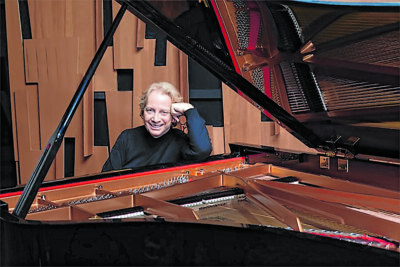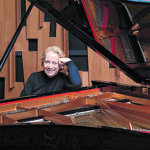“Once I sluggishly died to the idea of talking, my mind was free to roam.”
Those words begin a poem written
by Richie Specht, 27, using what is known as the Rapid Prompting Method (RPM). The poem was written when Richie was 20.
“It is a methodology used by a facilitator or a communication partner to assist the individual by either pointing, typing or writing,” said Richard Specht, Richie’s father. “Typically the lessons last anywhere from 30 to 45 minutes. In this particular session, my son pointed using one letter at a time on a laminated 8 ½ in. x 11 in. letter board.”
East Islip resident Specht became introduced to the world of autism when Richie, who was born at 27 weeks old and weighed one pound and 13 ounces, was 18 months.
“It wasn’t until 18 months that my wife suspected something,” Specht said. “He lost eye contact.”
Richie was brought to the now-closed Long Island College Hospital and in less than five minutes, the doctor mentioned autism.
“I had no idea what autism was, and quite frankly, looking back, I was probably in denial for at least five or six years,” Specht said.
The Spechts spent a lot of time doing research in order to provide the best life for their son, and, wanting to further serve his son and the community, Specht, for nine years, joined the Long Island Chapter Board of Autism Speaks, which he says was therapeutic because he was able to talk to other individuals in the autism community.
Specht, now retired from financial technology company Broadridge as a senior vice president and account leader, began publishing his podcast, My Words Are My Voice, in May 2023.
“Since I’ve done this podcast, I had no idea where this thing was going to go,” Specht said.
The podcast, My Words Are My Voice, is now listened to in 17 countries. Currently, it has nine episodes, consisting of poetry from non-speaking individuals, as well as Specht’s commentary. One episode is released each month. This month’s episode features a conversation between two men who are non-speaking.
“They’re over 50 years old,” Specht said. “They probably only started communicating somewhere in their 40s through the letter board, and now they’re having a conversation… Now, they’re conversing and sharing their thoughts and their feelings.”
RPM was created by Soma Mukhopadhyay, who created the method to speak with her son. In 2003, she was asked to join the Halo Clinic, based in Austin, Texas. When Specht’s wife, Rose, learned about RPM, it took about a year to get on Mukhopadhyay’s calendar. Finally, the family was able to come to the clinic in Texas for four days, with two sessions each day.
“Soma would see my son,” Specht said. “My wife and I would participate just to observe what this methodology was. And by the second day, my son was doing three-digit multiplication. Being a New Yorker, I was like, ‘I don’t believe it.’”
He was solving these math problems without a calculator and getting 80 percent of the questions right. Specht said he was also impressed by Richie’s ability to correctly spell and answer questions.
“But after the third day of each session, I just sat back and I was absolutely stunned,” Specht said. “Now, we come back to New York. My son was 16. There’s no communication partners to help guide my son, so through this community of women, they started flying Soma up to New York with her son to basically provide sessions for their kids. So we were part of that.”
Oftentimes, Specht explained, non-speaking individuals are also diagnosed with apraxia, a disorder of the brain and nervous system that makes it difficult to perform tasks or movements when asked despite understanding the request.
“I think [RPM] opens up their lives, to saying ‘okay, you know what, you finally have recognized that I’m an intelligent individual,” Specht said.
When asked what Specht has learned through reading and sharing poems created through RPM, he said that he’s been humbled and feels blessed.
“I just feel that I’m on the right path,” Specht said. “I really believe they need to be respected for who they are as individuals and recognized because they want to be part of our lives.”
Specht added that nine out of 10 times when he receives the poems and reads them, he cries, thinking about the amount of energy and focus it takes during the 30 to 45-minute sessions to tap each letter when the writer already knows what they want to say.
“They’re in tune with something we’re not in tune with,” Specht said, later adding “What I’ve learned, it’s continued to humble me.”
My Words Are My Voice is available on Spotify, iHeartRadio, Apple Podcasts, Twitter (X) and Facebook.
Organizations such as the American Speech-Language-Hearing Association do not support the use of RPM, citing risks such as practitioners purposely or accidentally inserting their own message.
Podcasts Share Poems From Non-Speaking, Autistic Community
Facebook
Twitter
LinkedIn
Pinterest
Pocket
WhatsApp
Facebook
Twitter
LinkedIn
Pinterest
Pocket
WhatsApp
Never miss any important news. Subscribe to our newsletter.
Related News

From Subway Cars To Gallery Walls
April 26, 2024

Harmonious Maestro
April 26, 2024


Oyster Bay: A Golden Gem
April 24, 2024

The Pioneering Primatologist
April 24, 2024

Chuck Scarborough: A Beacon of Journalistic Longevity
April 19, 2024



Adam Ant To Stand And Deliver With New Tour
April 5, 2024

World-Famous Broadway Composer Recognized On Long Island
March 29, 2024

Kombucha: Unlock The Power Of Probiotics
March 28, 2024

Never miss any important news. Subscribe to our newsletter.
Recent News

From Subway Cars To Gallery Walls
April 26, 2024

Harmonious Maestro
April 26, 2024


Oyster Bay: A Golden Gem
April 24, 2024

The Pioneering Primatologist
April 24, 2024

Chuck Scarborough: A Beacon of Journalistic Longevity
April 19, 2024

